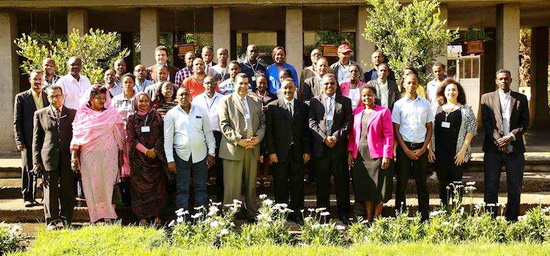
Ethiopian Environment Minister Promotes Biotech to Address Food and Economic Challenges
March 15, 2017| |
Ethiopia's State Minister of Environment, Forest and Climate Change, H.E. Mr. Kare Chawicha has urged African governments to consider biotechnology for improving food security and overcoming economic challenges. H.E Chawicha expressed concern over the region's vulnerability to climate change and lauded the application of advanced technologies in agriculture. He was speaking at a biotechnology and biosafety communication training workshop for media practitioners held in Addis Ababa, Ethiopia, on March 7-9, 2017.
"More than 20 years have passed since introduction of biotech crops varieties, with cultivated area reaching close to 180 million hectares" he said. Despite this unprecedented growth, the minister noted that there are still concerns and uncertainties about GMOs. He faulted the continent's inconsistent biotechnology and biosafety policies for slow progress witnessed across the region and urged policy makers to "access cutting edge scientific evidence and advice to be able to make the best decisions about tough challenges facing the region."
Journalists were urged to take advantage of such media trainings to enhance factual reporting on biotechnology and biosafety since they play a key role in shaping public opinion. Dr. Getachew Belay, COMESA's Biotechnology and Biosafety Policy Advisor, added that issues on biotechnology and biosafety that influence technology adoption are regularly misrepresented due to lack of proper communication with the media and packaging of the right messages. He further stated that COMESA's Biotechnology Implementation Plan (COMBIP) seeks to strengthen public awareness and communication on biotechnology and biosafety between COMESA member states. Dr. Margaret Karembu, ISAAA AfriCenter's Director congratulated Ethiopia for revising its law to pave way for research and emphasized the importance of political will for an enabling biotechnology environment.
The workshop, attended by 30 journalists and editors from Egypt, Ethiopia, Kenya, Rwanda, Sudan, and Uganda, was organized by COMESA-ACTESA in partnership with the Ministry of Environment and Forest, of Ethiopia, ISAAA AfriCenter, and the Open Forum on Agricultural Biotechnology, Ethiopia Chapter.

For more information about biotechnology in Africa, contact Dr. Karembu at mkarembu@isaaa.org.
| |
Biotech Updates is a weekly newsletter of ISAAA, a not-for-profit organization. It is distributed for free to over 22,000 subscribers worldwide to inform them about the key developments in biosciences, especially in biotechnology. Your support will help us in our mission to feed the world with knowledge. You can help by donating as little as $10.
-
See more articles:
-
News from Around the World
- Religious Leaders in Uganda Learn about New Agricultural Technologies
- Ethiopian Environment Minister Promotes Biotech to Address Food and Economic Challenges
- US Joins the International Treaty on Plant Genetic Resources for Food and Agriculture
- Cornell University Professor Advocates Consumption of GMOs
- University of Arizona Scientist Develops Aflatoxin-free Corn Using RNA from Fungus
- Benefits of Plant Science to ASEAN's Smallholder Farmers Highlighted at Jakarta Forum
- Indian Universities Develop Bt Cotton Varieties with Reusable Seeds
- Agricultural Academy of Japan Proposes Conduct of Confined Field Trial of GM Crops
-
Research Highlights
- Scientists Investigate Effects of GE Maize on Arthropod Food Webs
- Citrus Psorosis Virus Coat Protein-derived Construct Confers Resistance in Citrus against Psorosis
-
Beyond Crop Biotech
- Tilapia Fish Holds Genetic Key to Salt Tolerance
- ESF Scientists Develop Transgenic American Chestnut Trees
-
Resources
- Voices and Views: Messages to the Public
- The Petri Dish Goes Online
-
Plant
- CRISPR/Cas9-based Gene Knockout in Watermelon
-
Read the latest: - Biotech Updates (January 21, 2026)
- Gene Editing Supplement (December 17, 2025)
- Gene Drive Supplement (February 22, 2023)
-
Subscribe to BU: - Share
- Tweet
